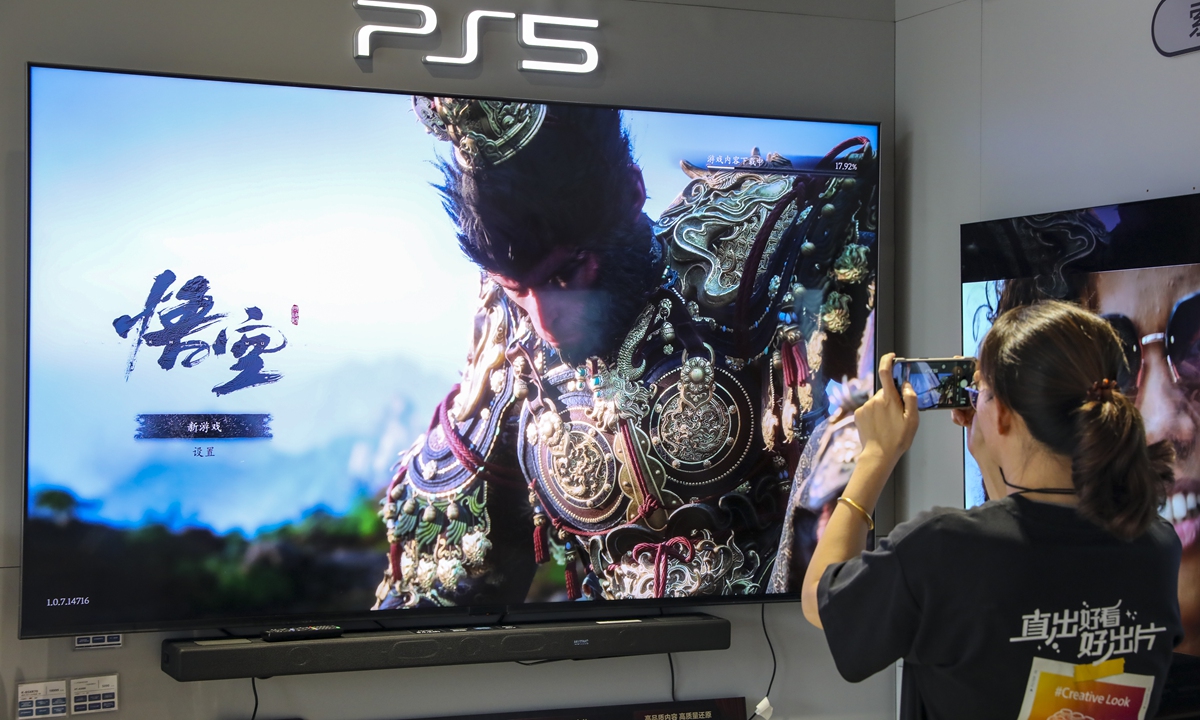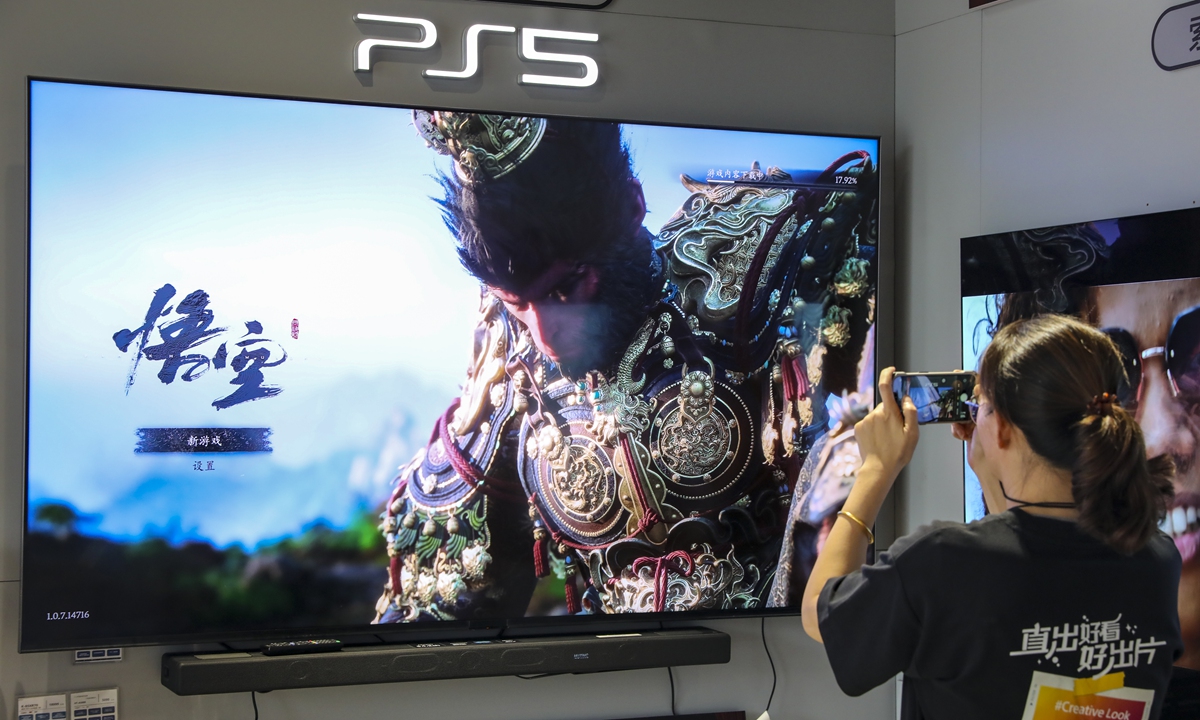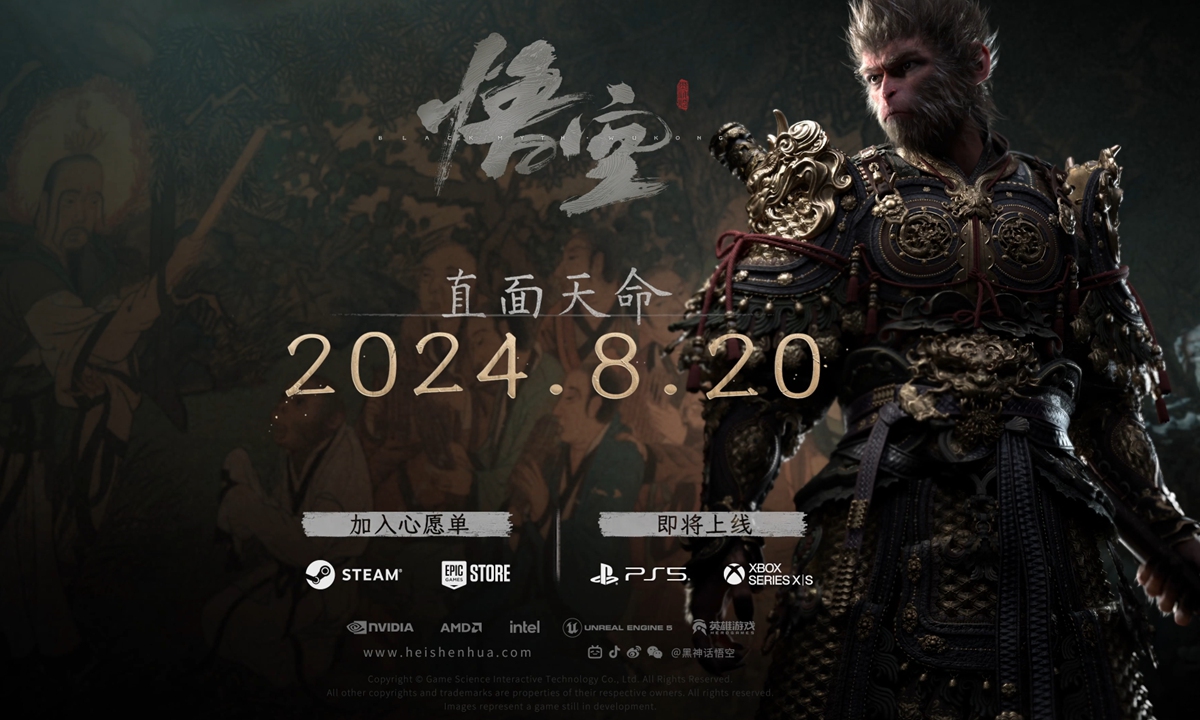
A woman takes a photo of a screen showing Black Myth: Wukong at an electronics market in Shanghai on August 20, 2024. Photo: VCG
Long-awaited Chinese game Black Myth: Wukong, inspired by the story of Monkey King, topped PC gaming platform Steam's chart by a large margin after launch on Tuesday and triggered widespread discussions on its cultural implications.
With beautiful graphics and a new narrative based on the Chinese classic novel Journey to the West, the game Black Myth: Wukong has not only attracted core players, but also intrigued the public in China and around the world.
Many see the game as a milestone in Chinese gaming industry from both technical and artistic perspectives. Moreover, video games, once bore the stigma of "digital heroin," can also be a carrier of culture and knowledge.
After its launch on Tuesday, the number of concurrent players on the platform Steam quickly surpassed Counter-Strike 2, propelling Black Myth: Wukong to the top of Steam's most played chart.
The concurrent players on Tuesday peaked over 2 million worldwide on Steam. The actual figure was believed to be higher because the game was also released on PlayStation 5, which does not provide a real-time tracker for concurrent users.
As China's first true AAA game - high development costs, long production cycles, and significant resource investment - Black Myth: Wukong represents a major breakthrough for the Chinese gaming industry, observers said.
Most previous popular Chinese video games are mobile games that make profit by encouraging continuous microtransactions while limiting production costs. But Black Myth: Wukong is a one-time purchase AAA game, a Chinese video game industry insider surnamed Wang told the Global Times.
The game is sold at 268 yuan ($38) in Chinese mainland and $59.99 on PlayStation 5's North American store.
It is unclear whether Black Myth: Wukong's business model can bring more profits, but the more important thing to me, and to many of the players out there, is that China is finally getting its own AAA game that can excite the world," Wang said, hailing the game's significance to the industry as a whole.
AAA games used to mainly come from the US, Europe and Japan, and it was hard to imagine China developing such a game close to their standard several years ago, Wang said
Cultural bridge
In Journey to the West, one of the Four Great Classical Novels of Chinese literature, Tang Monk and his disciples successfully obtained Buddhist scriptures, Monkey King (Sun Wukong) was named Fighting Buddha and gradually vanished without a trace.
Many years later, the player controls a young monkey who, inspired by the legend, decides to follow Sun Wukong's footsteps to the West, overcoming various difficulties and trials, ultimately forging and transforming the player's own will.
To authentically recreate the scenes for Black Myth: Wukong, the game's development team visited several scenic spots in North China's Shanxi Province, incorporating many elements of Shanxi's painted sculptures.
Shanxi culture and tourism authority recently released an official promotional video for the game, showcasing real locations where the game got inspirations, including Xiaoxitian (Small Western Paradise), Yuhuang Temple, and Tiefo Monastery, attracting many bloggers to visit these sites as part of a "cultural pilgrimage."
Many YouTubers as well as netizens on other social media platforms such as Reddit also expressed huge interest in Black Myth: Wukong, making it not just a game, but also a cultural bridge that connects China and the world, observers said, noting that global players will be able to get a deeper understanding of traditional Chinese culture while having fun.
The success of Black Myth: Wukong indicates a milestone of China's game industry. It was developed by a domestic studio based on a traditional classic and can compete with its global counterparts, Liu Dingding, a veteran industry observer, told the Global Times on Tuesday.
Favorable policy also facilitates the emergence of more high-quality games alike, said Liu.
China's National Press and Publication Administration on February 27 released a list of 111 games that had been granted publication licenses for the month, and Black Myth: Wukong was included.
In China, video games were used to be called "digital heroin" given the possibility of addiction, particularly among children, and that was believed to be a reason why relevant authorities have been very careful granting publication licenses for video games.
However, Chinese authorities have recently introduced a series of supportive policies to encourage innovation, protect intellectual property rights, and promote the internationalization of the gaming industry. Now video games have proven themselves to be capable of becoming arts and spreading Chinese culture among not only Chinese, but also foreign players, observers told Global Times.



